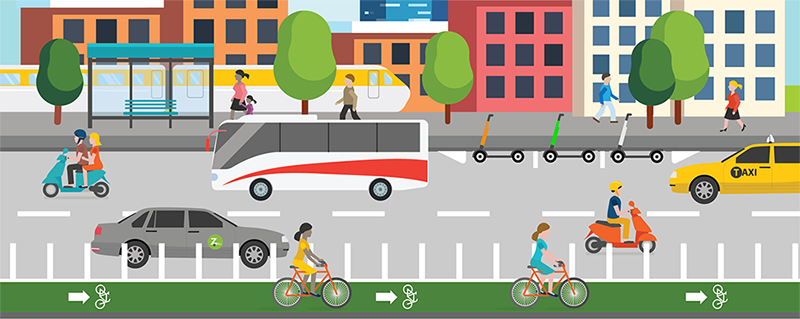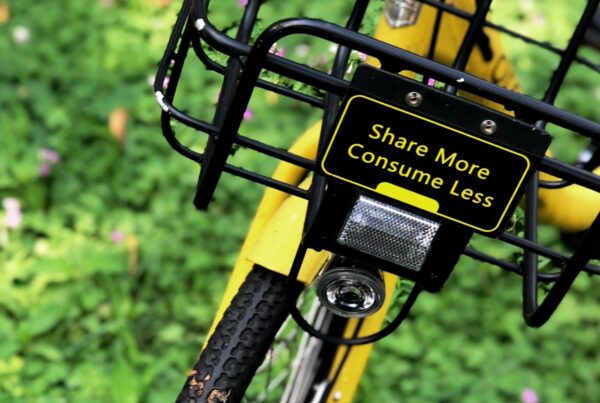Welcome to the Shared-Use Mobility Center’s weekly guide to the most impactful news, thought-provoking articles and innovative technologies that are shaping our transportation future. We believe in sharing information, just like sharing cars, bikes, and scooters, so if there’s anything additional you’d like to see, just drop us a line.
SUMC News and Announcements
New SUMC policy paper on Mobility as a Service
Mobility as a Service (MaaS) is based on a simple premise: transportation isn’t an end in and of itself. Rather all the modes of transportation available to us: transit, carshare, micromobility including bikeshare and e-scooters, on-demand rides such as microtransit, and ridehailing, serve one essential purpose: to get you from point a to point b. (Okay, bikes and scooters are pretty fun.)
MaaS integrates these options in a single interface, with a single payment mechanism. While the promise is great for environmentally-sound, equitable, and accessible mobility, there are challenging issues to be addressed before MaaS can be realized, including fare payment integration, data-sharing agreements, and workable business models in a financially-strapped COVID-19 environment.
SUMC’s new policy paper, Towards the Promise of Mobility as a Service (MaaS) in the U.S., provides a guidepost for public and private sectors to work together to achieve Maas, with topology, principles, case examples—and inspiration.
Read the paper on the MOD Learning Center.
Video: The Role of Urban Planning, Architecture, and Transportation in Chicago’s Future
On Monday, August 17, the Chicago Fed’s Project Hometown convened a diverse panel of experts to address and examine how the city can recover from the pandemic, overcome longstanding inequities, and rebuild for resilience. Among the notable speakers at the forum was SUMC Founder and Executive Director Sharon Feigon.
Check out this conversation about the future of Chicago.
Fill up your calendar with Federal Transit Administration events
Stay in the know and connect with colleagues at roundtables, webinars, workshops, and more. View the calendar.
Mobility Justice
“When we start building new transportation systems and structures not rooted in white supremacy, anti-Blackness, and land theft, we have to ask ourselves who has the power in building that system.” Read how crucial the shift from talk to action is in developing truly equitable transportation systems from diversity expert Tamika L. Butler.
Chicago, like other US cities, is facing a major budget crisis and public transit is at the chopping block during a time when essential workers, a majority of whom are from communities of color, need reliable transportation. Streetsblog is right, we must continue fighting to fund sustainable mobility options.
The Tennessee Voices videocast expands on the need to create transit options to address the inequities faced by people of color working essential jobs in lower-income areas in this interview with Ashley Northington, the Vice Chair of community-focused transportation solutions organization Moving Forward.
It all comes down to funding and the COVID-19 pandemic has shown the inherent flaws in the way public transit is subsidized. The Conversation makes the case for changing the model.
Ridehailing/Carsharing/Carpooling
Sen. Elizabeth Warren (D-Mass) pens an op-ed about the classification of gig economy workers, such as drivers labeled as independent contractors by ridehailing companies, and the need to grant them basic employee rights and protections (and a higher minimum wage) to boost their economic and social prosperity.
The Talking Headways podcast chats with Waze’s Head of Public Sector Partnerships Dani Simons about the crowdsourced nature of the app’s carpooling network and how flexible shifts in commuting habits, along with innovations in mobility tech, have helped expand mobility options for typically-solo drivers.
Chinese e-commerce giant Alibaba is reportedly in talks to invest $3 billion into Southeast Asian ridehailing leader Grab, in doing so acquiring some stock in the company currently held by Uber.
A new ridehailing app called Wystle is set to hit London this winter to compete with local players Kapten, Bolt (and possibly Uber if they can manage to reinstate their license to operate in the UK), and it claims to offer drivers the “lowest commission rate on the market” at 13%.
Bikesharing and Micromobility
Lyft chose not to participate in Chicago’s 2020 scooter pilot. Instead, they are focusing on Divvy expansion, particularly in the city’s impoverished South and West sides, where new Divvy stations and ebikes have been given the go-ahead after federal delays. Read more on Medium.
Classified by French automaker Citroën as an “urban mobility object,” the electric Ami vehicle can be rented by people aged 14 and over (even without a license) and hits a steady 28mph to offer a unique micromobility experience in Paris. The Guardian takes a spin in the “toute petite voiture”.
Listen as Executive Director of the North American Bikeshare Association Samantha Herr and Shared Mobility Product Manager at Mobility Data Heidi Guenin discuss the Generalized Bikeshare Feed Specification or GBFS, a micromobility data standard, and how it relates to the mobility data specification on the Micromobility Industries’ podcast.
Chicago will give the Logan Square neighborhood much need protected bike infrastructure along the cycle-heavy Milwaukee Avenue in a bid to lower biking-related crashes from cars. What’s next in the city’s active transportation plans? Better pedestrian crosswalks and bus-focused street improvements to be built later this year.
Madison, WI has started testing electric cargo bikes, made by Saris Infrastructure, for city workers that need the extra load capacity while helping lower city-made emissions, operate cheaper fleets, and save energy/space. The company now has its sights set on partnering with the City of Portland, OR later this fall to expand the e-cargo offering.
Transit
Check to see if there is likely to be space on your next bus or train with the Chicago Transit Authority’s updated ridership dashboards tool, which displays the average capacity depending on the week schedule and time of day for any bus and rail line in the city.
LA Metro, along with Harvard School of Business, the Duke Center for Advanced Hindsight, and mobility providers, was awarded a $700,000 grant by the Federal Transit Administration to develop a research project that will study and test a rewards program to incentivize transit, walking, biking, ridehail, and telecommuting options over driving. Congrats!
Starting this week, New York MTA riders will face a $50 fine if they don’t wear a mask while riding on the transit system as a “last resort” measure to curb the spread of COVID-19.
Baltimore had a bustling streetcar system up to the early 1960’s that included dozens of lines and 101 streetcar vehicles. What went wrong? The Baltimore Sun digs up an old Baltimore Transit Company annual report to find out why such a well-conditioned transit network was dismantled for the buses that run on the city’s streets today.
Technology
A new report helmed by city consultancy group Steer and autonomous technology startup Nuro looks at the social, economic, and environmental impacts of driverless delivery service deployment in the US and how small self-driving EVs could usher in a new job market while reducing future traffic collisions and CO2 emissions.
Transportation solutions company Trakk has announced its new multi-passenger management software service, aimed at commercial commuting providers, to help companies and organizations optimize route services, online ticketing, and reservations with built-in reporting and data analysis tools.
Transit riders can now plan and pay for their entire trip all through the Moovit app in 13 local transit agencies around Ohio and Kentucky as part of a new collaboration between NEORide, Masabi, and Moovit.
New York’s contactless fare payment system OMNY has officially been installed in all 151 subway stations and 800+ buses in Manhattan, marking a notable completion that will continue to offer seamless transit payment across the city’s boroughs.
Sustainability
Vox borrows research data from Morgan Stanley to illustrate the causes and origin of GHG emissions from countries around the globe (including the most polluting sectors) and frames how this data can help us lead accountability measures and conversations around a cleaner world.
Learn about seven community-based urban development movements, spotlighted by Planetizen, that are shaping the way cities create sustainable resources and reinitiate the use of public space to help people from the ground up.
NACTO’s Global Designing Cities Initiative released its Designing Streets for Kids guide to help cities plan for safer, kid-friendly public spaces that boost the quality of life for everyone in communities while keeping the little ones moving, active, and spatially engaged.
Equitable transit-oriented development (eTOD) will become a larger priority in Chicago with the city’s first eTOD development plan that was created “to address the market failures…” and build affordable, dense housing around transit in Black and ethnic-minority communities around the South and West sides.
Requests for Proposals, Inquiries, and Information
Shared-Use Mobility Center Job Postings
See current openings
RFP 21-02 Zero Emission Bus Implementation Study
Alexandria Transit Company (DASH) and the City of Alexandria, Virginia
Alexandria, Virginia
Deadline: October 7, 2020
RFP: Services for the Chestnut Street Multimodal Station, Shared Services Facility & City of Oxford Passenger Rail Platform
Butler County Regional Transit Authority
Oxford, Ohio
Deadline: October 19, 2020
NEW RFP: $200 Million For Renewable Energy Supplier for All City-Owned Buildings
City of Chicago
Chicago, IL
Deadline: November 6, 2020
Did someone forward this to you? Sign up for our newsletter here.




